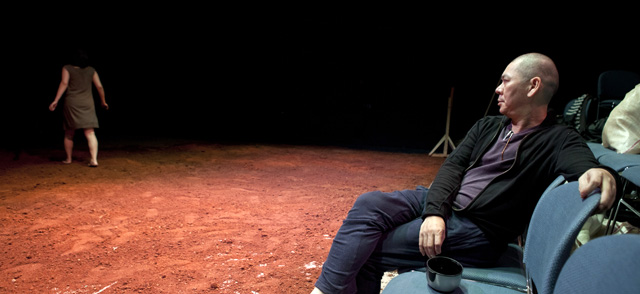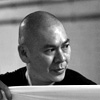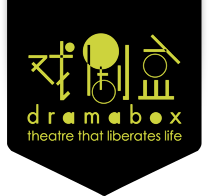
The Question is the Answer —
15 Minutes with Tsai Ming-liang
Written by Kate, Wang Fang
In April, Malaysian-born but Taiwan-based film director Tsai Ming-liang came to Singapore for the production of Only You, his return to theatre after 27 years. We had the honour of doing a short interview with him, in his dressing room at The Esplanade. Even though the interview lasted only 15 minutes, the director nevertheless freely shared his views and opinions on cities, arts and culture, education, and even environmental issues.
Wang Fang (Wang):
Now that you've staged your performance, what impression do you have of the Singapore audience?
Tsai Ming-liang (Tsai):
I feel that theatre-goers, especially audiences of experimental theatre, usually have some experience watching theatre shows, so basically I am not too worried about their reception. This is my first time performing in Singapore — I think the audiences who attended the shows these few days were really great. Even when some of them wished to leave the theatre, they did so politely and quietly.
Wang: |
Could you tell us what you think of the city and the different kind of spaces it comprises of? For instance, the private space, the public space, or even the cyber space? |
Tsai: |
There are certain spaces that I would not venture, for example the cyber space. I am an old man, so I don't criticise too much, and furthermore there are a lot of spaces that I am not that familiar with. There are more spaces to explore now than in the past, so it is simply a matter of wanting to explore them or not. I think the city should provide more options for people to choose from. The public space can actually offer a lot of possibilities — for instance, when you put up a stage, naturally there will be people who wish to do a performance. The government tends to promote recreational activities such as sports and shopping, but would they also expose the people to culture? For instance, are there any installation artworks around? Can we play basketball or roller-skate? Are the artists invited to do some works? These are questions that a city should think about. There are a lot of possibilities, so it depends on whether the government or the relevant agencies want to deal with them, whether or not they want to enrich the city, or do they simply want to promote commercial activities such as putting up advertisements. People will use whatever you give to them. |
Wang: |
What kind of role do you think artists or cultural workers should take up in the society? |
Tsai: |
Why do we need the arts, and why do we need culture? If we are already civilised, do we still need them? I feel that we are not really civilised: do I refrain from littering because I fear punishment, or because I believe that I should not do so? Why do legal restrictions exist? I feel that we hardly ever contemplate these questions... Either we comply with the law, or we reproach it; but more often than not, we simply abide by the rules and not discuss or debate about them. I believe that we need to recognise the truth. The same goes for the "smoking incident" this time round.¹ It may be scientifically proven that smoking is harmful to one's health. But is smoking a form of freedom too? Everyone has already come to a consensus not to smoke in certain public spaces, but what about in performances? A performance does not only involve the present, it also involves many complications about time and space, and many factors about realism. Do you want to watch a real performance, or an empty, falsified one? These questions are actually open for discussions; and not, simply out of convenience, banning smoking everywhere, even in the theatres. Honestly, I don't have an answer too. What is the role of an artist? Why do we need culture? Well maybe because we don't have enough culture. Why do we need the arts? If the arts can cultivate one's nature, doesn't it imply that we have a terrible nature? (laughs) Artists are probably just people who raise questions. He or she doesn't have an answer — how can he or she give you an answer? Which artist can tell you how to live in order to be happier? How to fall in love without getting hurt? How to have a marriage without divorce? What kind of marriage is correct? What kind of life is correct? Can any artist tell you these? You cannot possibly have an answer; at the end you can only have one answer: you will die — everyone will die. Answers will change with age and mindsets. When you raise a question, that question is in fact already an answer. The answer is the question; the question is the answer. |
Wang: |
Xiao Kang (Lee Kang-sheng) mentioned during the performance that you discouraged him from fishing because of your environmental concerns. Can you share your thoughts on the environment? |
Tsai: |
Simply speaking, we are not God. No one is God. If this entire world is a giant food chain, there will not be too much of anything, nor will everything become extinct. So, this is how it is… if nobody destroys it, it will be kept in its original state. It was 20 years ago when we heard about the Ozone layer. Once we've understood what it is, we are no longer afraid, and then we continue to exploit, to make money, to cut down forests, to continue making pollutants. Everyone knows about these, but we cannot stop. Why? Simply because we are too greedy! We think we are God, that we can change the world. We have a long-held belief system that taught us to want many things. But we know that there aren't so many things. If everybody wants a lot, it will be really terrible. In the past, it used to be very hot in Julys at my hometown in Sarawak, because the indigenous people practise slash-and-burn agriculture. There wasn't much pollution at that time — they only practised slash-and-burn during one particular season. But after a few years, Singaporeans started smelling thick fumes from Indonesia, because people are no longer practising slash-and-burn, but instead burning down the entire forest for planting palm trees. This then becomes an environmental problem. Slash-and-burn will make the soil fertile, so it is different. The concept of Capitalism is really very dreadful — it turns the whole world into a giant corporate, and makes money from the whole world. Ultimately, the environmental problem stemmed from our education. Teaching humans is still akin to "making silk purse out of a sow's ear"... The system instils in us a value-system: success is measured by how wealthy you are, or how famous you are. To do creative work like me is silly. What should we do then? Educate, change it! There is no second alternative. Who can change it? I believe the artists, or educationist — no matter which "-ists" — anyone who is sensitive enough, would want to change it. |
¹ The current Singapore law banned smoking in theatres and indoor public places. As Only You contains smoking scenes, the play was originally withdrawn from Huayi Festival 2012. Soon after, however, the National Environment Agency made a one-time exemption to allow Only You to retain its smoking scene and perform in Singapore.

|
Born in Malaysia in 1957, Tsai Ming-Liang is one of the most prominent film directors of the new cinema movement in Taiwan. In 1994, his film Vive L'amour was honoured with the Golden Lion award at the Venice Film Festival, and established a place for him in the world of international film. In 2009, the first dramatisation of Louvre Museum's collection "Le Louvre s'offre aux cineastes," entitled Face, has become the benchmark for films venturing into the world of art galleries. In recent years, Tsai Ming-Liang has also moved into installation art. His works have been displayed in Venice, Shanghai, Nagoya, and have been well-received. Among the pieces, It is a Dream has been reserved as a permanent exhibit at the Taipei Fine Arts Museum since 2010. At the invitation of the National Chiang Kai-Shek Cultural Center in 2011, Tsai has returned to theater performance with three monodramas, entitled Only You, after 27 years of absence. Since 2012, he has been working on a long project of filming Lee Kang-Sheng's slow walk, cooperating with various cities and organizations. To date, he has completed four short works. |

Win a pair of David The Best 2.0 Kucing Kuraps FTW tickets worth S$58 each!
Share a personal story on the power of the little, on Drama Box's Facebook page now. Story that garners the most "Like" will win a pair of David The Best 2.0 Kucing Kuraps FTW tickets worth S$58 each!
- Submission deadline: All stories to be submitted before 30th September 2012.
- In case of dispute regarding contest winner and prize, the decision of Drama Box shall be final.
*Note: David The Best 2.0 Kucing Kuraps FTW is performed in Mandarin without English surtitles!

